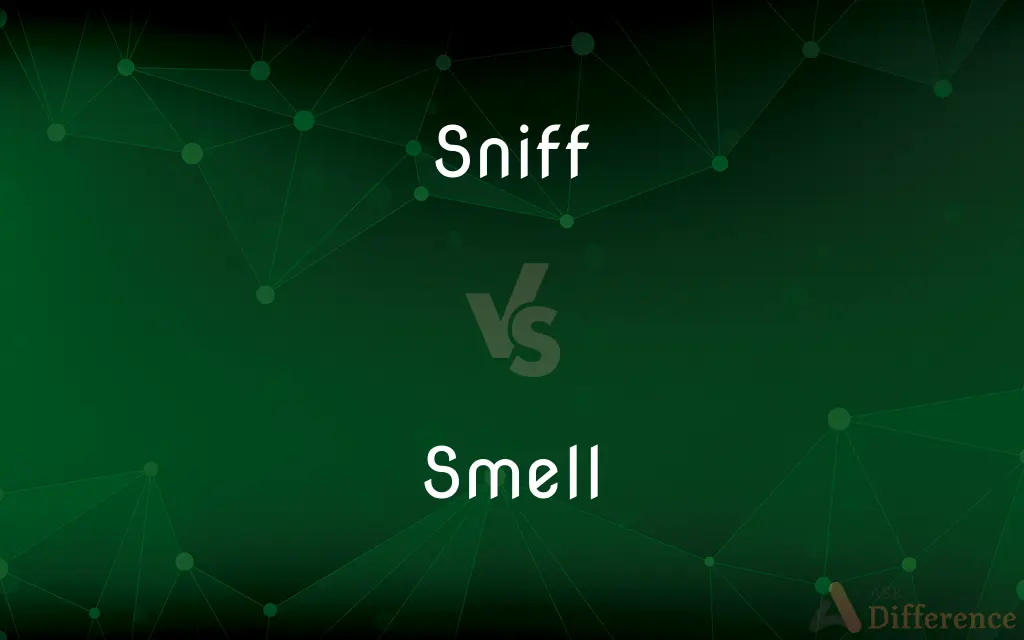Sniff vs. Smell — What's the Difference?
By Maham Liaqat & Fiza Rafique — Updated on March 27, 2024
Sniffing is the act of actively drawing air into the nose to detect scents, whereas smelling is the passive ability to perceive odors.

Difference Between Sniff and Smell
Table of Contents
ADVERTISEMENT
Key Differences
Sniffing involves a deliberate action, where one inhales through the nose to draw in air, along with any scents or odors it contains, to more effectively detect and analyze them. This action can enhance the perception of smells by bringing more odor molecules into contact with the olfactory receptors in the nose. On the other hand, smelling is the process by which odors are perceived, regardless of whether one is actively trying to smell something or simply passively experiencing scents in their environment.
While sniffing is a voluntary behavior that can be controlled and initiated as desired, smelling is a continuous, passive sensory experience that occurs whenever there are odorants present in the environment that reach the olfactory receptors. This means that one can smell odors without consciously deciding to do so, whereas sniffing requires a conscious effort to inhale air and scents more deeply into the nose.
Sniffing can be seen as a technique to enhance the smelling process, especially when trying to identify or enjoy a particular scent more fully. It is commonly used in contexts where the scent is weak or difficult to discern, such as wine tasting or trying to identify a faint smell. Smelling, however, encompasses the entire scope of detecting odors, from strong, immediate odors to subtle fragrances that might be enhanced through sniffing.
The distinction between sniffing and smelling is also relevant in discussions about olfactory sensitivity and training. For instance, professionals who rely on their sense of smell for work, such as perfumers or sommeliers, might develop their sniffing technique to improve their ability to identify and distinguish between complex scents. However, the underlying ability to smell is a basic sensory function shared by most people and many animals, enabling the detection of and reaction to the chemical composition of the environment.
Both sniffing and smelling play important roles in daily life and survival. Smelling helps organisms detect food, recognize danger (such as smoke or spoiled food), and even communicate or interact socially through pheromones and other scent markers. Sniffing, as a more active form of scent detection, can amplify these capabilities, making it easier to pick up on specific odors that might otherwise be overlooked.
ADVERTISEMENT
Comparison Chart
Definition
Actively drawing air into the nose
Passive ability to perceive odors
Nature
Voluntary and deliberate
Continuous and passive
Purpose
Enhance the perception of scents
Detect and respond to environmental odors
Technique
Used to identify or enjoy scents more fully
Involves passive reception of odors
Sensory Process
A method to improve smell detection
Basic sense involved in detecting odors
Compare with Definitions
Sniff
An active process of inhaling air to detect scents.
She sniffed the perfume to appreciate its complex notes.
Smell
The passive perception of odors through the nose.
The smell of freshly baked bread filled the kitchen.
Sniff
Improves the detection of faint or subtle scents.
He sniffed the air, trying to identify the source of the smoke.
Smell
Does not require deliberate action.
They smelled smoke long before seeing the fire.
Sniff
A technique developed in professions relying on scent.
The wine expert sniffed the glass carefully before tasting.
Smell
Occurs continuously in the presence of odorants.
Even without trying, she could smell the rain approaching.
Sniff
Can be controlled to enhance scent perception.
The chef sniffed the spices to distinguish their freshness.
Smell
A basic sensory function for detecting environmental odors.
The ability to smell danger, like gas leaks, is crucial for safety.
Sniff
Often used to identify specific odors.
The dog sniffed around the room, searching for its toy.
Smell
Enables the detection of and reaction to various scents.
The smell of their favorite food made them hungry.
Sniff
To inhale a short, audible breath through the nose, as in smelling something.
Smell
The sense, located in the nasal cavities of mammals and relying on the olfactory nerves, by which molecules borne in a fluid such as air can be perceived; the olfactory sense.
Sniff
To sniffle.
Smell
A similar sense in other animals, as insects' ability to perceive air-borne molecules with their antennae.
Sniff
To use the sense of smell, as in savoring or investigating
Sniffed at the jar to see what it held.
Smell
The act or an instance of smelling
Got a smell of the pie.
Sniff
To regard something in a contemptuous or dismissive manner
The critics sniffed at the adaptation of the novel to film.
Smell
A quality of something that is perceived by the sense of smell; an odor
The smell of a barn.
Sniff
(Informal) To pry; snoop
The reporters came sniffing around for more details.
Smell
A distinctive enveloping or characterizing quality; an aura or trace
The smell of success.
Sniff
To inhale forcibly through the nose
Sniffed the cool morning air.
Smell
To perceive (an odor) by the sense of smell.
Sniff
To smell, as in savoring or investigating
Sniffed the lilacs.
Sniffed the breeze for traces of smoke.
Smell
To perceive or detect (something) by a chemosensory organ, such as an antenna.
Sniff
To perceive or detect by or as if by sniffing
Dogs that sniffed out the trail through the snow.
Sniffed trouble ahead.
Smell
To inhale the air near (something); sniff
Smiled as she smelled the rose.
Sniff
To utter in a contemptuous or haughty manner
The countess sniffed her disapproval.
Smell
To detect or discover, as by intuition or inference
We smelled trouble ahead. The committee tried to smell out corruption in law enforcement.
Sniff
An instance or the sound of sniffing.
Smell
To use the sense of smell.
Sniff
Something sniffed or perceived by or as if by sniffing; a whiff
A sniff of perfume.
A sniff of scandal.
Smell
To sniff
The dog was smelling around the bed.
Sniff
(ambitransitive) To make a short, audible inhalation, through the nose, as when smelling something.
The dog sniffed around the park, searching for a nice scent.
I sniffed the meat to see whether it had gone off.
Smell
To have or emit an odor
"The breeze smelled exactly like Vouvray—flowery, with a hint of mothballs underneath" (Anne Tyler).
Sniff
(transitive) To say (something) while sniffing, such as in case of illness or unhappiness, or in contempt.
"He's never coming back, is he?" she sniffed while looking at a picture of him.
Smell
To have or emit an unpleasant odor; stink
This closet smells.
Sniff
(transitive) To perceive vaguely.
Smell
To be suggestive; have a touch of something
A remark that smells of sanctimony.
Sniff
(intransitive) To pry; to investigate in an interfering manner.
Smell
To appear to be dishonest or corrupt
The political situation is starting to smell.
Sniff
To be dismissive or contemptuous of something.
This opportunity is not to be sniffed at.
Smell
A sensation, pleasant or unpleasant, detected by inhaling air (or, the case of water-breathing animals, water) carrying airborne molecules of a substance.
I love the smell of fresh bread.
Sniff
(computing) To intercept and analyse packets of data being transmitted over a network.
Smell
(physiology) The sense that detects odours.
Sniff
To inhale drugs (usually cocaine) through the nose, usually in powder form.
Smell
(transitive) To sense a smell or smells.
I can smell fresh bread.
Smell the milk and tell me whether it's gone off.
Sniff
(countable) An instance of sniffing.
She gave the flowers a quick sniff to check they were real.
Smell
Followed by like or of if descriptive: to have a particular smell, whether good or bad.
The roses smell lovely.
Her feet smell of cheese.
The drunkard smelt like a brewery.
Sniff
(countable) A quantity of something that is inhaled through the nose.
Smell
To smell bad; to stink.
Ew, this stuff smells.
Sniff
A brief perception, or tiny amount.
Smell
To have a particular tincture or smack of any quality; to savour.
A report smells of calumny.
Sniff
Cocaine.
Smell
To detect or perceive; often with out.
Sniff
A short inhalation sound, sometimes associated with crying.
Smell
(obsolete) To give heed to.
Sniff
To draw air audibly up the nose; to snuff; - sometimes done as a gesture of suspicion, offense, or contempt.
So ye grow squeamish, gods, and sniff at heaven.
Smell
(transitive) To smell of; to have a smell of
Sniff
To draw in with the breath through the nose; as, to sniff the air of the country.
Smell
To perceive by the olfactory nerves, or organs of smell; to have a sensation of, excited through the nasal organs when affected by the appropriate materials or qualities; to obtain the scent of; as, to smell a rose; to smell perfumes.
Sniff
To perceive as by sniffing; to snuff, to scent; to smell; as, to sniff danger.
Smell
To detect or perceive, as if by the sense of smell; to scent out; - often with out.
Can you smell him out by that?
Sniff
The act of sniffing; perception by sniffing; that which is taken by sniffing; as, a sniff of air.
Smell
To give heed to.
From that time forward I began to smellthe Word of God, and forsook the school doctors.
Sniff
Sensing an odor by inhaling through the nose
Smell
To affect the olfactory nerves; to have an odor or scent; - often followed by of; as, to smell of smoke, or of musk.
Sniff
Perceive by inhaling through the nose;
Sniff the perfume
Smell
To have a particular tincture or smack of any quality; to savor; as, a report smells of calumny.
Praises in an enemy are superfluous, or smell of craft.
Sniff
Inhale audibly through the nose;
The sick student was sniffling in the back row
Smell
To exercise the sense of smell.
Smell
To exercise sagacity.
Smell
The sense or faculty by which certain qualities of bodies are perceived through the instrumentally of the olfactory nerves. See Sense.
Smell
The quality of any thing or substance, or emanation therefrom, which affects the olfactory organs; odor; scent; fragrance; perfume; as, the smell of mint.
Breathing the smell of field and grove.
That which, above all others, yields the sweetest smell in the air, is the violent.
Smell
The sensation that results when olfactory receptors in the nose are stimulated by particular chemicals in gaseous form;
She loved the smell of roses
Smell
Any property detected by the olfactory system
Smell
The general atmosphere of a place or situation and the effect that it has on people;
The feel of the city excited him
A clergyman improved the tone of the meeting
It had the smell of treason
Smell
The faculty of smell
Smell
The act of perceiving the odor of something
Smell
Inhale the odor of; perceive by the olfactory sense
Smell
Emit an odor;
The soup smells good
Smell
Smell bad;
He rarely washes, and he smells
Common Curiosities
What is the main difference between sniffing and smelling?
The main difference is that sniffing is an active process of inhaling to detect scents, while smelling is the passive perception of odors.
Why do people sniff when trying to identify a scent?
People sniff to draw more air and scent molecules into their nose, enhancing their ability to identify and analyze the scent.
Is sniffing more effective than just smelling for detecting scents?
Sniffing can be more effective for detecting faint or subtle scents by actively drawing more odor molecules into the nose.
Do animals use sniffing differently than humans?
Many animals rely more heavily on sniffing to enhance their already superior sense of smell for tasks like hunting or social interaction.
Are there conditions that affect the ability to smell?
Conditions like anosmia can affect the ability to smell, impacting taste and safety awareness.
Can the ability to smell be improved by practicing sniffing?
Practicing sniffing can improve one's technique and sensitivity to scents, but the basic ability to smell is a passive sensory function.
How is smelling important for survival?
Smelling is important for detecting food, danger, and social cues, playing a crucial role in survival and interaction.
Can you smell without sniffing?
Yes, you can smell without sniffing as smelling occurs passively whenever there are odors present to be detected by the olfactory receptors.
How do professionals train their sense of smell?
Professionals may train their sense of smell through repeated exposure to and analysis of a wide range of scents, often using sniffing techniques to distinguish subtle differences.
Why might someone not be able to smell certain odors?
Factors such as nasal congestion, environmental conditions, or specific anosmias to certain scents can affect the ability to smell them.
Share Your Discovery

Previous Comparison
Renin vs. Rennin
Next Comparison
Dale vs. GlenAuthor Spotlight
Written by
Maham LiaqatCo-written by
Fiza RafiqueFiza Rafique is a skilled content writer at AskDifference.com, where she meticulously refines and enhances written pieces. Drawing from her vast editorial expertise, Fiza ensures clarity, accuracy, and precision in every article. Passionate about language, she continually seeks to elevate the quality of content for readers worldwide.
















































